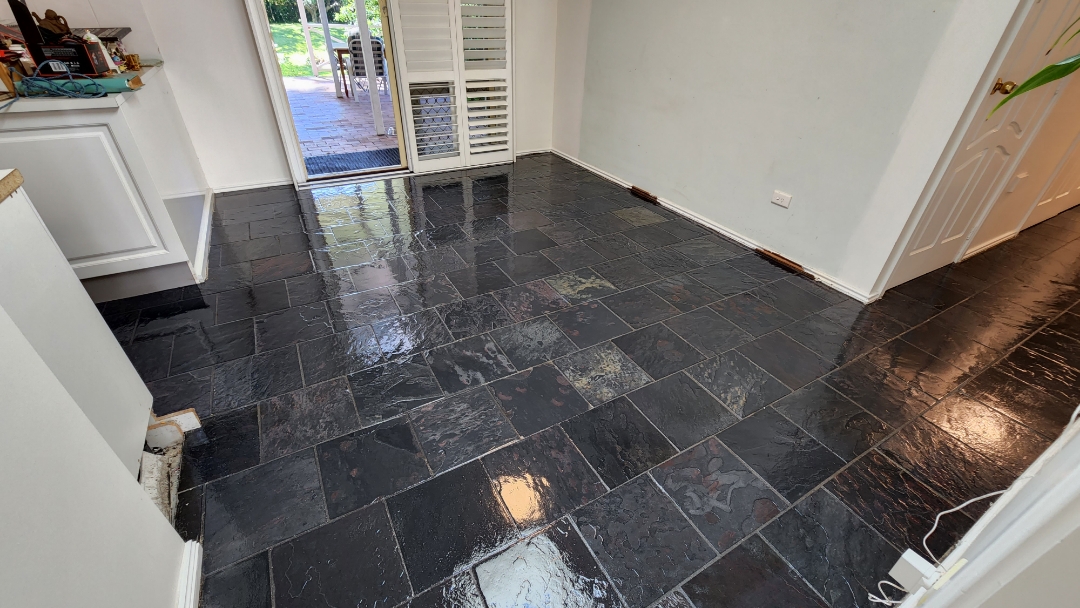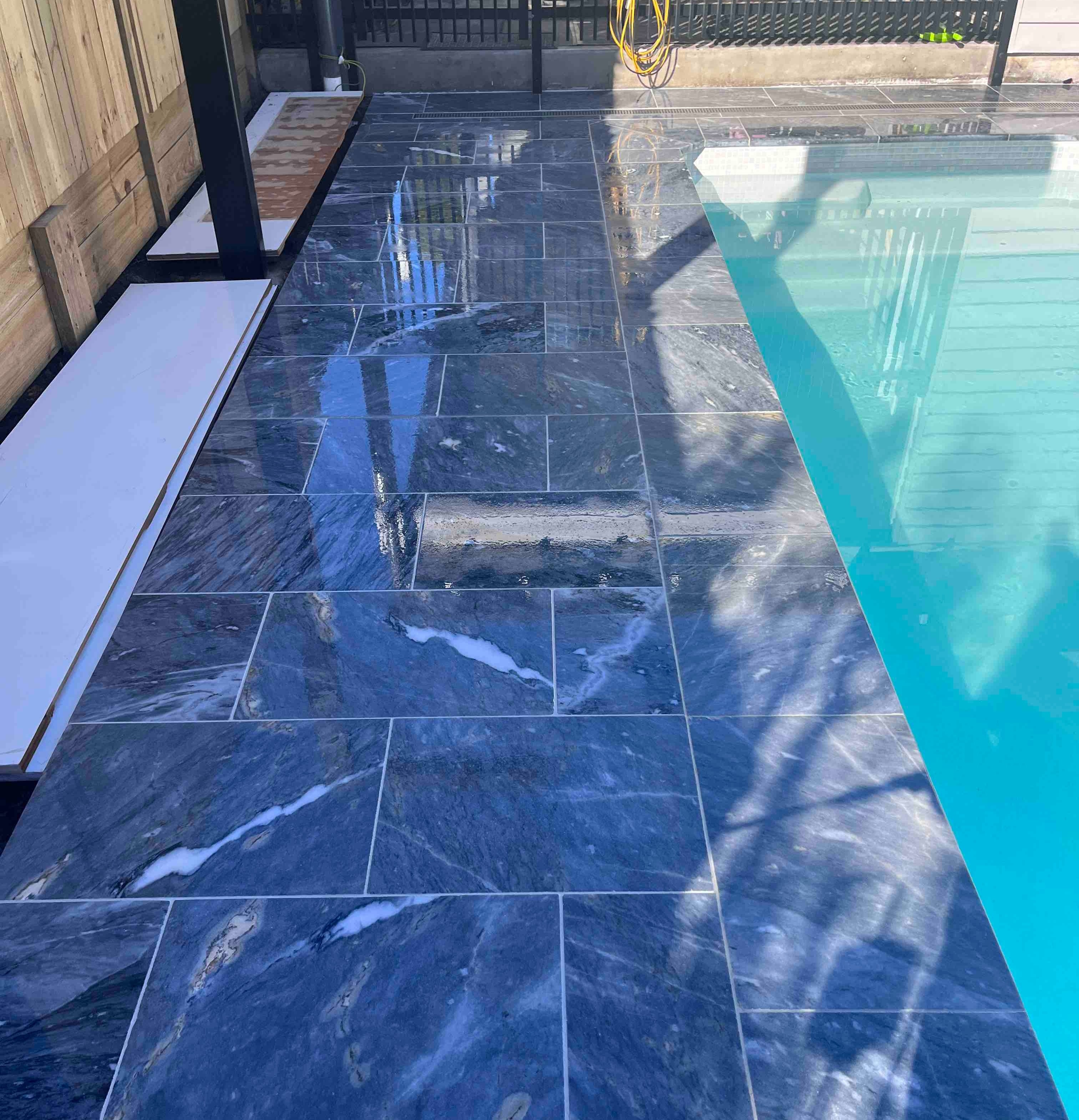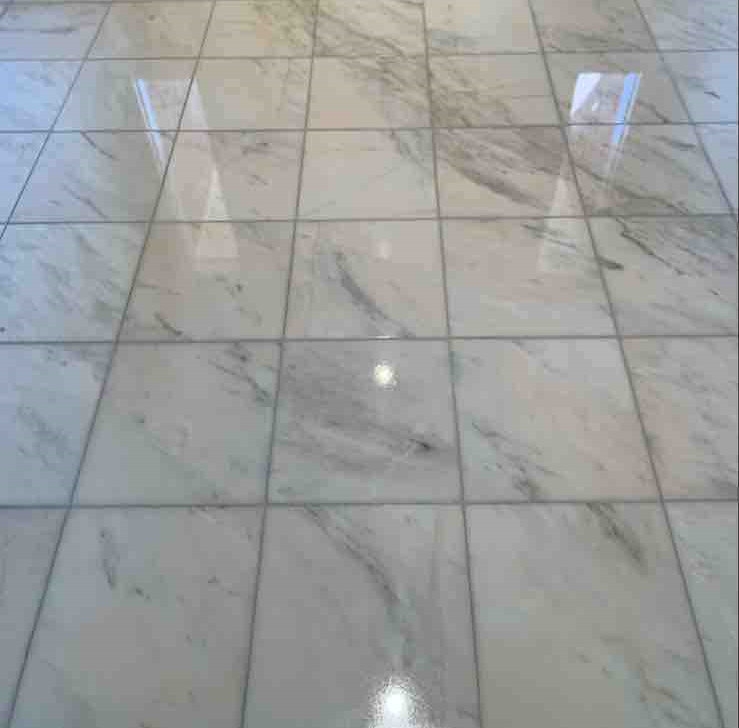Selecting the ideal sealer can be a daunting task given the multitude of options available in today's market. Determining which sealer is the most suitable choice for your travertine stone can be challenging. Questions such as which one will effectively work, which one won't, which sealer aligns with your specific needs, and how they vary can arise.
Preserving and Safeguarding Travertine Stone
Sealing prevents moisture-carrying stains from being absorbed by your travertine.All-natural stone wall and floor tiles, including travertine stone, possess a level of absorbency. When a teaspoon of water is poured onto an unsealed travertine tile, its absorption rate becomes evident, showcasing its porous nature. This porosity, characterized by small pinholes and open fissures inherent to its natural texture, makes travertine prone to absorbing potential stains.
When utilized for flooring and wall covering, travertine stone tiles demand meticulous preparation, sealing, and continual maintenance.
Unsealed travertine stone quickly absorbs moisture.
Travertine stone, being porous, can trap dirt and stains in its pores and grout if left unsealed
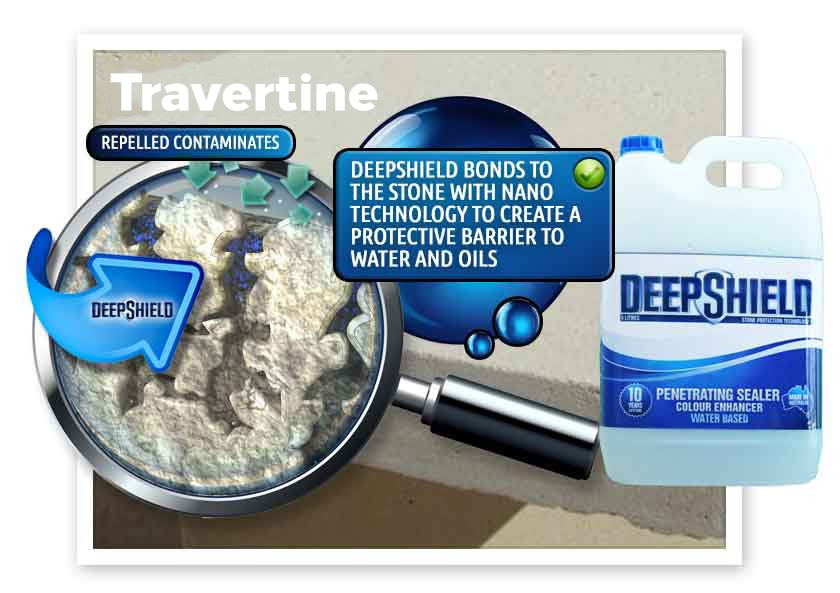 Sealing travertine stone offers several advantages:
Sealing travertine stone offers several advantages:
- Prevents stains
- Guards against discoloration
- Enhances protection for travertine
- Improves surface appearance
- Simplifies regular maintenance
When travertine is sealed, cleaning becomes effortless. Regular sweeping and occasional washing with a soft cloth and soap and water can maintain its pristine condition for years. Sealing travertine with a high-quality stone sealant such as Penetrating Sealer can prolong its lifespan and prevent harmful moisture, mold, and calcification.
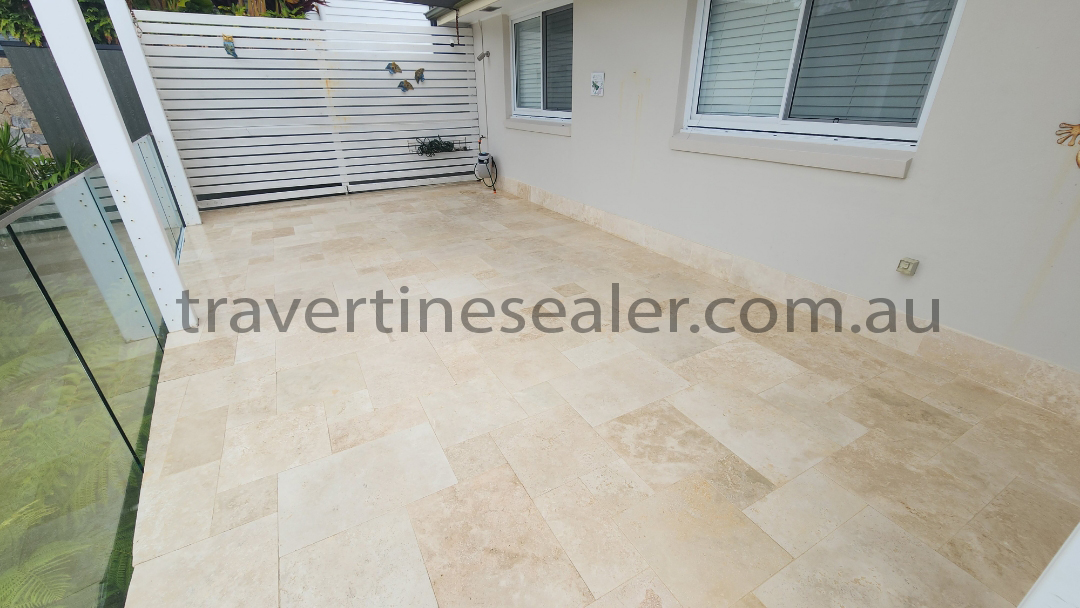
Once sealed, cleaning travertine stone is a breeze!
Choosing the Best Sealer
Penetrating impregnating sealers are formulated with a liquid carrier, which can be either water or solvent based. These sealers penetrate into the small pinholes and open fissures just below the surface of travertine stone. Once absorbed, the carrier evaporates, leaving the sealer behind to chemically react with the surface pores, forming a breathable protective barrier.
Using an impregnating sealer helps safeguard your travertine surface and grout from absorbing stains, while also making cleaning and maintenance significantly easier. While some sealers may last only a few years, Australia's range of impregnating water-based sealers can last for up to 15 years.
Solvent-based sealers are typically only necessary in extreme cases and are generally not recommended. Water-based sealers leverage modern technologies such as nanotechnology and fluoro-polymer technology, making many older solvent-based products outdated.
Solvent-based products often emit toxic fumes that can pose health risks, and their application may require vacating the area for up to 48 hours. Additionally, solvents can cause damage to property such as skirting boards, doors, paint, and adjacent areas.
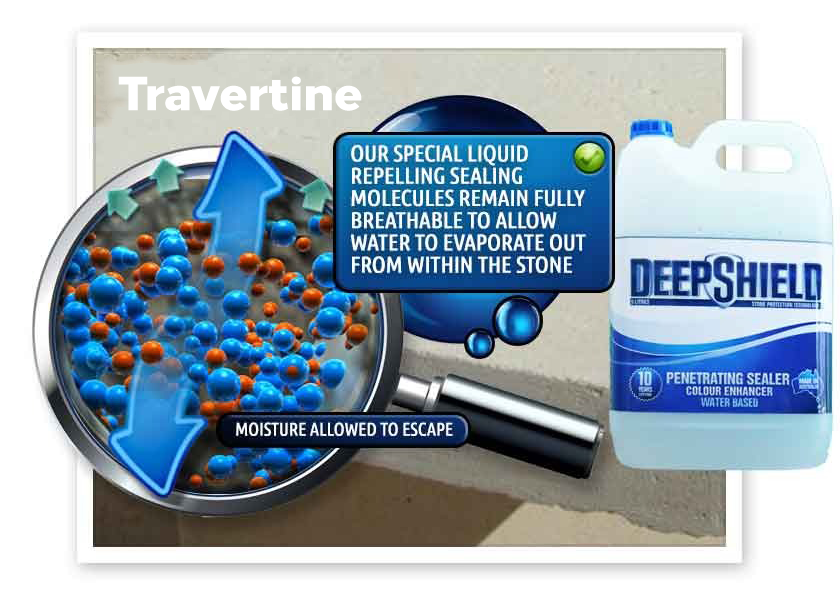
- For optimal protection against oil and water-based stains, as well as to preserve the appearance and slip resistance of your travertine, it is advisable to seal it with a premium, invisible, fully breathable impregnating sealer. This helps prevent harmful moisture from being trapped within the stone.
impregnating sealers are typically suitable for both interior and exterior applications, including wet areas like kitchens, bathrooms, laundries, patios, and around swimming pools.
Properties of Impregnating Sealer for Travertine:
- Penetrates into the travertine substrate and bonds its protective layer to the walls within the micro-pore structure, enabling complete vapor transmission through the stone.
- Does not alter the color or sheen of the travertine.
- Does not necessitate reapplication after each cleaning.
- Since the sealer does not sit on the surface, it won't scratch or scuff. Without a surface coating to wear off, the sealer doesn't need as frequent reapplication as topical sealers.
- A penetrating colour enhancing sealer is designed to enhance and enrich the natural look of travertine surfaces.
- The Penetrating Colour Enhancer is particularly suitable for travertine for two primary reasons. Firstly, it functions as an impregnating sealer, penetrating deeply into the pores of the travertine to offer durable protection against embedded dirt. Secondly, it incorporates color intensifying properties that accentuate the natural hues present in the travertine.
- Extended lifetime as the protection is integrated within the substrate, rather than merely on the surface.
- Resilience against UV light, suitable for both outdoor and indoor use.
- Permits the stone to breathe, facilitating the escape of retained moisture.
- Surface maintains traction, avoiding slipperiness.
- Enhances the longevity of travertine.
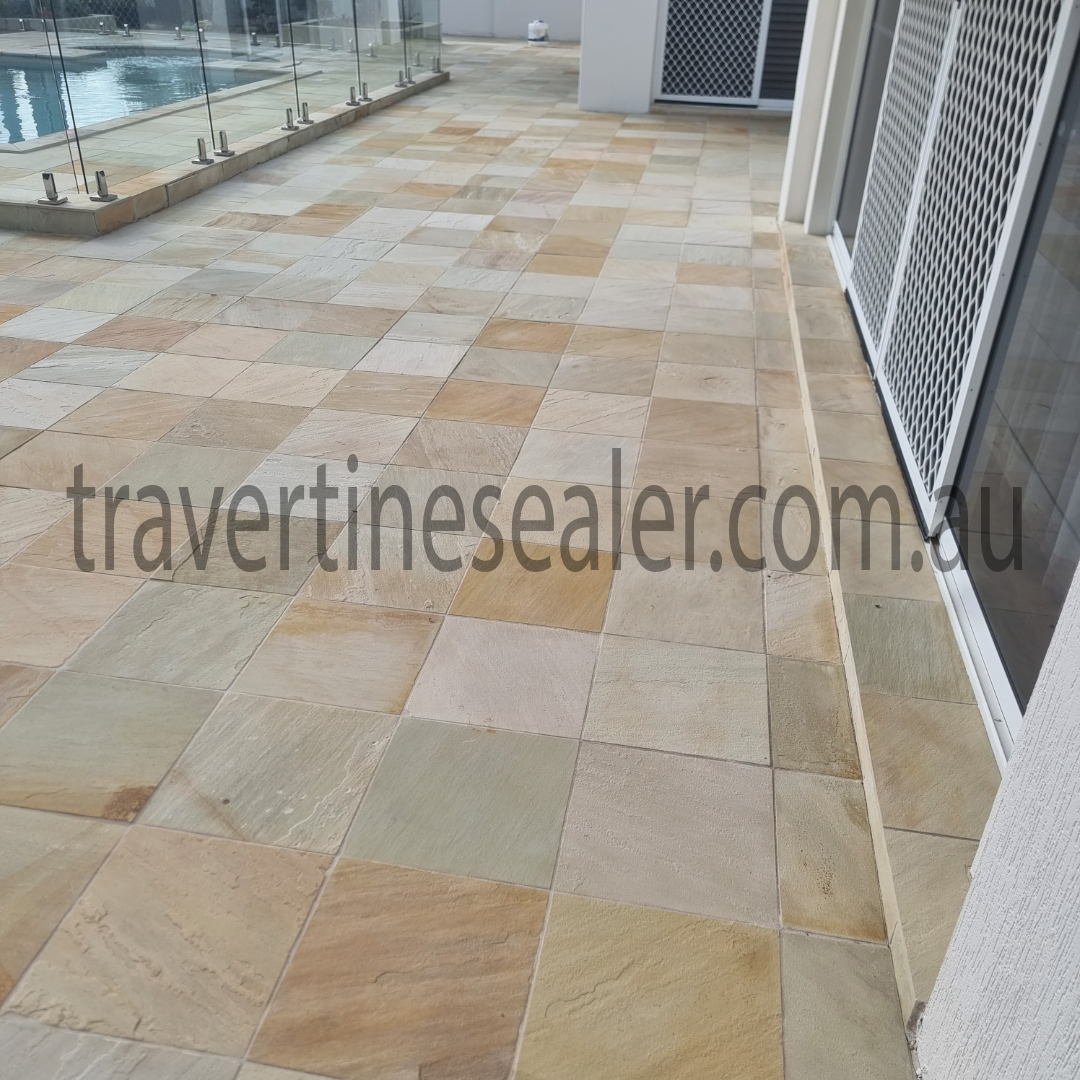 Utilizing a durable penetrating sealer for sealing will not only aid in stain prevention but also prolong the lifespan of your travertine, making regular maintenance significantly more manageable.
Utilizing a durable penetrating sealer for sealing will not only aid in stain prevention but also prolong the lifespan of your travertine, making regular maintenance significantly more manageable.
Impregnating penetrating sealants effectively penetrate into the travertine substrate itself, permeating the microscopic pinholes and open fissures that constitute its natural texture.
A clear impregnating sealer for travertine won't alter the appearance or texture of your sealed stone, preserves its ability to release vapor, and boasts a longer lifespan compared to film-forming sealers.
Key benefits include:
-
Unsealed travertine surfaces are notably porous and prone to enduring staining from common spills. Sealing is essential to safeguard your travertine against undesired staining and deterioration.
If you possess a travertine tiled floor, you're aware of its rapid absorption of liquids, making it susceptible to potential liquid-borne stains.
Topical sealers
Topical sealers generate a glossy protective coating on the surface of stone and masonry, whereas penetrating sealers permeate the surface of travertine, shielding the walls of each microscopic pore within its structure.
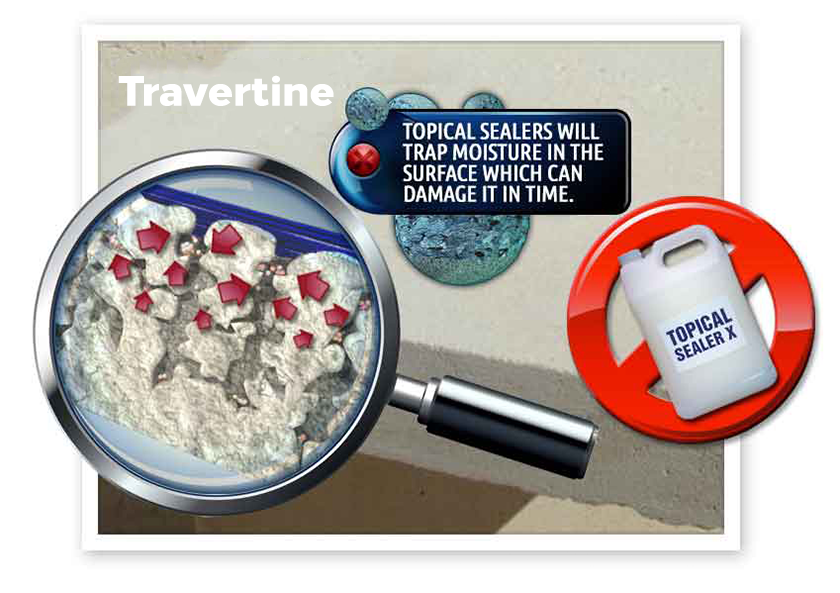
Certain drawbacks of topical sealers include:
- Necessitates frequent reapplication
- Requires complete removal before reapplication
- Prevents the stone from breathing, trapping moisture within
- Forms a shiny surface film susceptible to scratching or scuffing
- May cause the surface to become slippery when wet
- Alters the natural color of travertine
Red wine, oil, and grease, in particular, can cause damage to travertine that may require heavy resurfacing machinery for removal. While sealing travertine won't entirely prevent liquids from absorbing into it, it will afford you time to promptly wipe spills away before permanent damage sets in.
Cleaning and maintaining unsealed travertine flooring can be challenging as surface contaminants swiftly penetrate the porous travertine structure, making them tough to eliminate.
It's highly recommended to apply a deep penetrating impregnating sealer to travertine floors for long-lasting protection and stain resistance.
The top-quality penetrating sealer available today is Australian-made, offering non-solvent formulations that are easy to apply using a brush, roller, or sprayer and dry within a few hours. These deep-penetrating travertine sealers are offered in a dry, invisible finish or a slightly wet, color-enhancing effect and boast a lifetime of 10 to up to 15 years.
Pre-Sealing Preparation for Travertine:
- Prior to sealing, ensure that the surface is clean and in the desired condition, as it may be difficult to remove stains post-sealing without stripping away the sealer. Avoid using acidic cleaners on travertine as they can cause damage.
- Travertine should not have any other coatings such as wax or topical sealers before sealing, so any existing coating must be removed beforehand.
- The floor must be completely dry before applying most sealers.
- Select a high-quality, durable deep penetrating, impregnating sealer.
- Thoroughly clean your travertine before application to prevent dust and debris from being trapped once sealed.
- Follow proper application procedures and apply the appropriate number of coats.
- Keep in mind that with stone sealers, the quality typically corresponds to the price.
The number of coats needed will vary based on the porosity of the travertine; additional coats may be necessary. Once sealed, the tile will be resistant to staining, and as long as any stains are promptly wiped away, there will be no evidence of marks on the stone's surface.
Travertine stone varies in hardness and is inherently porous. When a small amount of water is applied to an unsealed travertine surface, it will be absorbed within seconds. Additionally, the porosity of travertine is influenced by its finish. For instance, highly polished travertine is less porous compared to travertine with a honed (matte) finish.
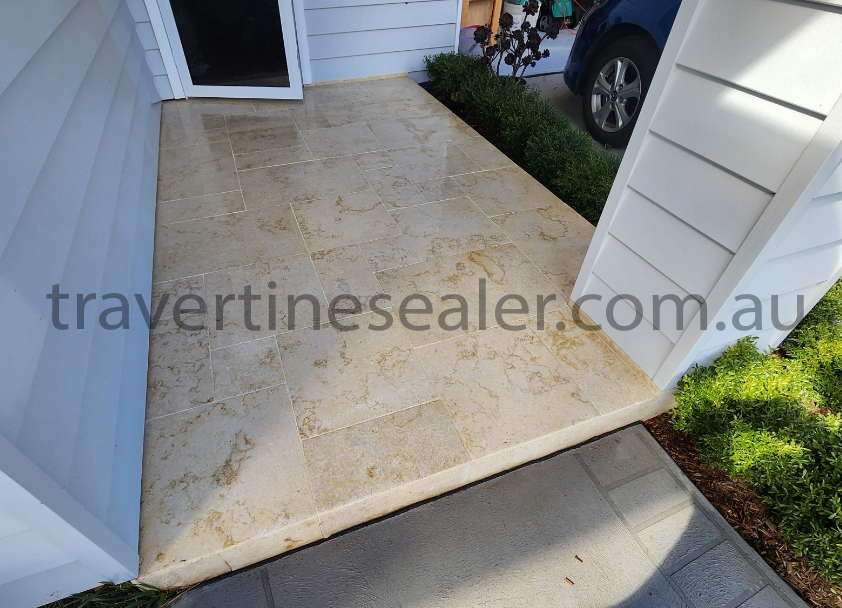
Incorporating fluoro-chemical technology, GOLD offers the most advanced protection against water and oil-based stains, ensuring long-term durability. Its micro-molecular formula chemically interacts with the travertine surface, forming a bond stronger than conventional sealers.
Simplifies maintenance for your travertine stone!
Offers robust defense against stains, exceptional oil and water repellency, maintains the natural surface appearance, non-film forming, breathable, and simple to clean and maintain, ensuring the preservation of your travertine's beauty.
How can I seal my travertine?
Select a reputable company with specialized equipment and expertise to properly seal and maintain your travertine after installation.
Maintain cleanliness of your sealed travertine, promptly wipe up spills, and clean periodically.
Professional cleaning not only eliminates surface dirt but also extracts deeply embedded dirt within the pores of travertine.
Reach out to a professional stone floor maintenance company equipped with the necessary tools and expertise to ensure your valuable surfaces meet your expectations.
Tile Cleaners Australia and StoneMaster are part of a network of independent Accredited Applicators extensively trained in the proper application of travertine care products. They offer comprehensive services, including thorough cleaning of the travertine area, product application, and post-treatment care.
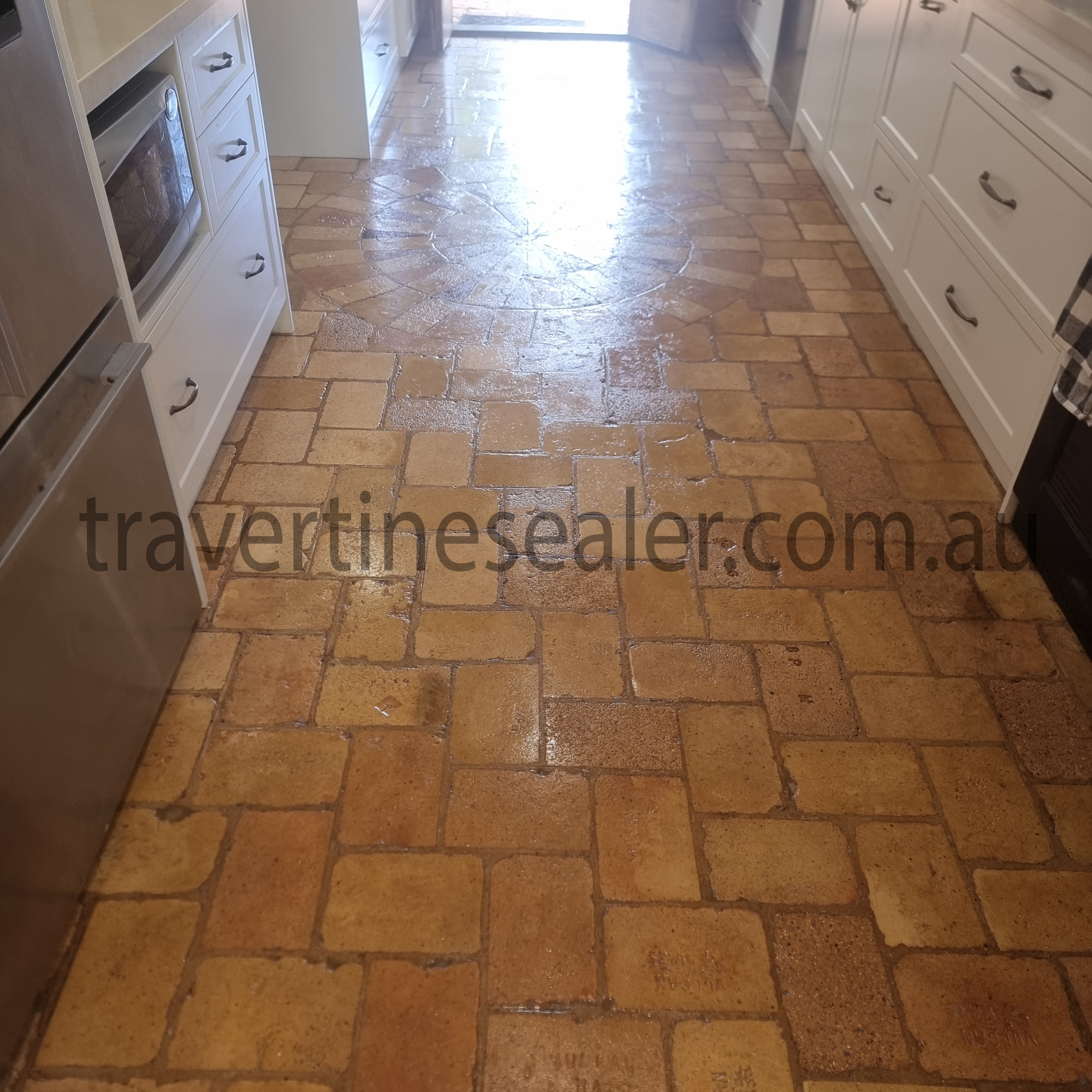
- Tile Cleaners Australia specializes in tile and grout cleaning, sealing, stripping, resealing, regrouting, grout color sealing, and minor tile repairs, making them Australia's leading tile care provider.
- StoneMaster adopts a diagnostic approach to each unique situation, conducting a full analysis and selecting the best restoration method, followed by maintenance procedures to ensure outstanding results.
It's crucial to thoroughly clean your travertine before sealing to prevent sealing in old stains or embedded dust and debris, which would require stripping and resealing.
Using an unsuitable or low-quality sealer may result in travertine surfaces that don't meet your satisfaction.



